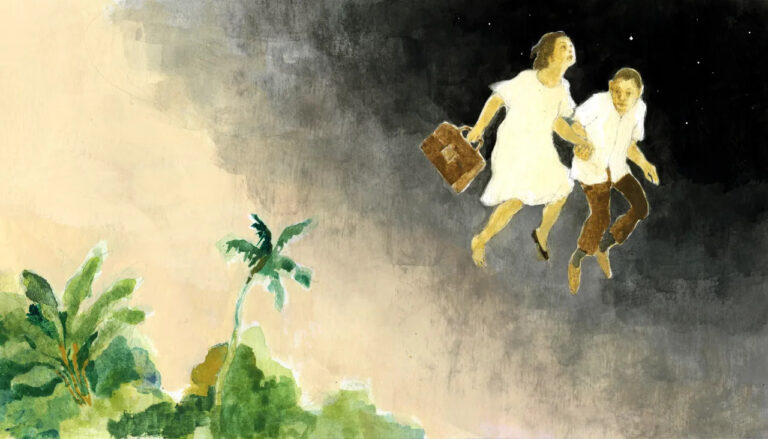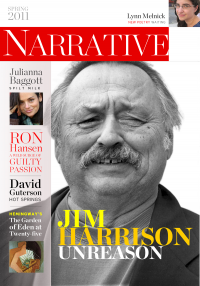“The Ark,” is a short film written by Viet Thanh Nguyen. It picks up after his celebrated novel “The Sympathizer,” continuing a complex and deeply intimate tale of war, displacement, and survival. It can also be seen on the Smithsonian Asian Pacific American Center website.
Credits:
Director and Artist – Matt Huynh
Writer and Narrator – Viet Thanh Nguyen
Composer – Kevin Shea Adams
Additional animation – Irene Feleo
Artist Assistants – Mark Wang, MJ Steele, Sasha Kimiatek
Produced by Smithsonian Asian Pacific American Center
Transcript below:
Prologue: The Ark
We did not wait for the flood but sought it, we the chosen people, even if the only ones who chose us were ourselves. We crouched blindly in the unlit belly of our ark, and as the waves drove us from side to side, we spoke in our native tongues. For some, this meant prayer, and for others, curses. We perspired from the heat of our overcrowded cohort, one hundred and fifty souls in a space not meant for us but for the fish of the sea, their overwhelming scent soaked into the wood of this, their sarcophagus. When we noticed a change in the manner of the waves, a more forceful shuttling of our vessel, one of the few sailors among us whispered, we’re on the ocean now. After hours winding through river, estuary, and canal, we had sailed away from the embrace of our motherland, the only land most of us had ever known and ever wanted to know.
The navigator opened the hatch and allowed us onto the deck of our ark, which the uncaring world called a boat. Above us floated the crescent moon’s lopsided smile, and by its light we saw ourselves alone on the surface of the watery world. For a moment we were happy, until most of us discovered two things. The first was that we had not yet digested our last meal, meager as it was, and the second was that we were gyroscopically unequipped for the rippling ocean. All over the deck, and all over each other, those of us neither sailors nor fishermen discharged what we had nurtured in our guts, and even after nothing remained we continue to heave and gasp, wretched with retching and shivering because of the ocean breezes. In this manner we passed our first night on the sea.
Dawn broke, and in every direction we turned, we saw only the infinitely receding horizon. If the night was cold, the day was hot, with no shade and no respite, with nothing to eat but a mouthful and nothing to drink but a spoonful, our rations limited and the length of our journey unknown. But even with having consumed so little, we still left our human traces all over the deck and in the hold, awash by evening in our filth. We could hardly wait for relief, and when we spotted a ship near the horizon at twilight, we screamed ourselves hoarse. The ship kept its distance. On the third day, we crossed into the shipping lanes and came across a freighter breaking through the vast desert of the sea, a dromedary with its bridge rising over its stern, sailors on its deck. Once again we screamed, and waved, and jumped up and down. Worst of all, we hoped. But the freighter sailed on, touching us only with its wake. On the fourth and fifth days, two more cargo ships appeared, each closer than the one before, each under a different flag, the sailors pointing at us. But no matter how much we begged, pleaded, and held up our children, these ships neither swerved nor slowed down.
On the sixth day, the first of the children died, and over her body, before we offered it to the sea, the priest said a prayer. On the seventh day, another child died. Some prayed even more fervently to God, some began doubting His existence, some who did not believe in Him began to believe, and some who did not believe continued not to believe. The father of one of the dead children cried, My God, why are You doing this to us? And only one of us on that ark knew the answer, me, for I was in great sympathy with God, if He existed. If so, then I had been made in God’s image, and knew that God must therefore be a bastard too, just like me. As one bastard to another, I knew the answer to humanity’s eternal question of Why?
It was, and is, simply this: Why not?
On the eighth day, He offered further proof of His existence by sending a cruise liner our way, the vacationers gathered on the railings to stare at us, our spectacle set to the beat of their dance music. We mustered ourselves for one last supplication, but when the cruise liner passed us by, buffeting our dreadful imitation of a yacht with its wake, we knew, at last, how the world saw us—a flotsam of flesh and the refuse of a nation.
Who were we? We were the wretched of the ocean, our hair black, our faces green, our skin blistered by sun and salt, weeping from festering sores. Strangers to each other before we clambered aboard this ark, now we were more intimate than those many lovers who had never seen their beloved wallowing in their own waste and that of others. Among our number were infants and children, for whom no milk remained in either bottle or breast. Among us were men and women, none of whom could be called handsome or beautiful after the sun’s treatment. Among us were those originally light-skinned and dark-skinned and every shade in between, but now uniform after being baked by the sun into the same shade. Most of us had fled our motherland because the communists in charge had labeled us puppet, or pseudo-pacifist, or bourgeois-nationalist, or decadent reactionary, or intellectual of the false conscience, or a relative of one of these. There was also a fortuneteller, a geomancer, a monk, the priest, and at least one prostitute whose Chinese neighbor spat on her and said, Why is this whore with us? Even among the unwanted there were unwanted, and I could only laugh. Misunderstanding my laugh, the prostitute scowled and said, What do you want?
Let me defer to the question of what we wanted, for who cares what I wanted? We, the unwanted, wanted so much. We wanted food, water, and sunscreen lotion. We wanted clean clothes, showers, and toilets. We wanted rain, clouds, and dolphins. We wanted it to be cooler during the hot day, and warmer during the freezing night. We wanted an estimated time of arrival not synchronous with being dead on arrival. We wanted to be rescued, not barbecued under this unrelenting sun. We wanted television, movies, and music, anything with which to pass the time. We wanted love, peace and justice, except for our enemies, whom we wanted to burn in hell, preferably for eternity. We wanted independence and freedom, except for the communists, who should all be sent to re-education, preferably for life. We wanted benevolent leaders who represented the people, by which we meant us, and not them, whoever they were. We wanted to live in a society of equality, although if we had to settle for owning more than our neighbor, that would be fine. We wanted a revolution that would overturn the revolution we had just lived through. In sum, we wanted to want for nothing, but somehow, in attempting to communicate all this to my interlocutor, all I managed was to laugh again and say, Nothing.
You’re a crazy bastard, aren’t you?
At one time in my life, I would have taken offense. But after all I had suffered, after all I had seen, perhaps I actually was a crazy bastard. Perhaps that was just another name for a man with two faces and two minds, whose sole talent was to see things from both sides, whose fate was to live in a world where most people saw things from only one side. At least I knew who I was. That was more than could be said for most. Even when a storm appeared on the horizon the next day, dominating the sky from north to south, my faith in my self could not be shaken. While the believers prayed to God and all else cursed Him, I turned to Bon, my childhood friend and fellow survivor of re-education, and said, I would rather have a brother like you than a god. And when he blinked his one remaining eye and called me a crazy bastard, I knew he felt exactly the same way.
While the faithful wept and the unfaithful cursed, I tied the plastic sack with my confession around my neck, the 367 pages that I had written during my many months in re-education and afterwards at the navigator’s house. Whether I lived or died, the weight of my words would hang on me. Even if the sea seized me, someone might still fish my body from the waters with my waterproofed words intact. I would not be subdued, not even by this storm, massive, dark and brooding, positively cerebral in its appearance, synaptic flashes of electricity lighting its furrows. Oh God, You magnificent bastard! You did exist after all! Nature did not have a sense of humor or irony, but You clearly did. I was in on the joke now, even if my shipmates weren’t. When I laughed, they looked at me as if I was out of my mind. Was I the only one who understood that we had nothing to lose?
Even my ghosts had disappeared, unwilling to follow me through this ordeal. There was no way to avoid the storm, surging closer and closer, except to vanish like those spirits of the men I had murdered, who had kept me such good and faithful company throughout my re-education. But vanishing I would not do myself, knowing who I was. And who was I? I was the man who needed no more fathers, no more uncles, and no more revolutions. I was the man who understood at last that my entire life had destined me to be one among this mass of frightful, filthy wretches, these displaced persons, these refugees, these people who, if they could not be called revolutionaries, could certainly be called rebels. I was the man who no longer accepted questions of whether I was one thing or another, or whether I stood on one side or the other, for I was neither/nor, fated to walk on the solidus, a daring acrobat, sui generis!
As if whipped into a frenzy by my own frenzy, the wind gained momentum, and our ark gained speed and altitude as the waves grew. Lightning illumined the monstrous brain, and thunder overwhelmed the collective groan that arose from the people. It was then I knew what needed to be done. Even as a torrent of rain exploded on us, and as the waves propelled our vessel ever higher, I leapt to the mast. From there, my confession a heavy pendulum on my neck, I called out to these poor devils, I, their messiah, I, their prophet. What did I know that they did not, besides the fact that I could not swim? What was it that I shouted to them as they stared at me with their eyes bulging and mouths agape, our ark perched on the snow-capped crest of a watery precipice, overlooking a deep valley? We will live. Yes, I was sure of it. We will live!
And then we plunged, howling, into the abyss.


